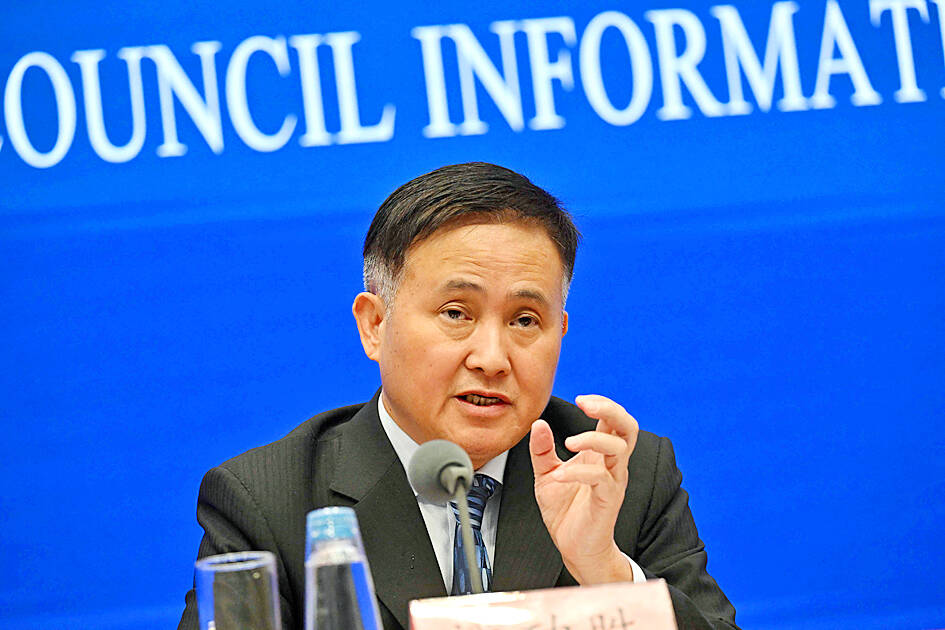China yesterday unveiled some of its boldest measures in years aimed at boosting its struggling economy as leaders grapple with a prolonged property-sector debt crisis, continued deflationary pressure and high unemployment among young people.
People’s Bank of China Vice Governor Pan Gongsheng (潘功勝) told a news conference in Beijing that the central bank would cut a slew of rates to boost growth, including a cut of 0.5 percentage points to the reserve requirement ratio in the near future, which dictates the amount of cash banks must hold in reserve.
The move would inject about 1 trillion yuan (US$141.7 billion) in “long-term liquidity” into the financial market, Pan said.

Photo: AFP
The central bank would also “lower the interest rates of existing mortgage loans,” he added.
The decision would benefit 150 million people across the country and lower “the average annual household interest bill by about 150 billion yuan,” Pan said.
Minimum down payments for first and second homes would be “unified,” with the latter reduced to 15 percent from 25, he said.
In addition, Beijing will create a “swap program,” allowing firms to acquire liquidity from the central bank, Pan said, a move he said would “significantly enhance” their ability to buy stocks.
“The initial scale of the swap program will be set at 500 billion yuan, with possible expansions in the future,” he said.
Shares in Hong Kong and Shanghai surged about 4 percent yesterday after the central bank’s announcement.
However, Moody’s Analytics economist Heron Lim (林師順) said that the move was expected given gloomy economic data in the past few months suggesting Beijing could miss its GDP growth target of 5 percent this year.
“But this is hardly a bazooka stimulus,” Lim told reporters. “Far more monetary easing and a stronger government stimulus is also desirable to finish bailing out the real-estate market and inject more confidence into the economy.”
At a minimum, “broader direct household support in helping them consume more goods will be useful, which is currently just too narrowly designed for industrial goods,” he said.
Another analyst said that the “measures are a step in the right direction.”
“We continue to believe that there is still room for further easing in the months ahead,” ING Bank NV chief economist for greater China Lynn Song (宋林) said.
Beijing has unveiled a number of measures aimed at boosting the property sector, including cutting the minimum down-payment rate for first-time homebuyers and suggesting that the government could buy up commercial real estate.
However, those failed to boost confidence and housing prices have continued to slide.
Adding further strain, local authorities in China face a ballooning debt burden of US$5.6 trillion, according to the central government, raising worries about wider economic stability.
Speaking alongside Pan, Chinese National Administration of Financial Regulation Director Li Yunze (李雲澤) said that Beijing would “cooperate in resolving real-estate and local government debt risks.”
“China’s financial industry, especially large financial institutions, is operating stably and risks are controllable,” Li said. “We will firmly maintain the bottom line of preventing systemic financial risks.”

Intel Corp chief executive officer Lip-Bu Tan (陳立武) is expected to meet with Taiwanese suppliers next month in conjunction with the opening of the Computex Taipei trade show, supply chain sources said on Monday. The visit, the first for Tan to Taiwan since assuming his new post last month, would be aimed at enhancing Intel’s ties with suppliers in Taiwan as he attempts to help turn around the struggling US chipmaker, the sources said. Tan is to hold a banquet to celebrate Intel’s 40-year presence in Taiwan before Computex opens on May 20 and invite dozens of Taiwanese suppliers to exchange views

Application-specific integrated circuit designer Faraday Technology Corp (智原) yesterday said that although revenue this quarter would decline 30 percent from last quarter, it retained its full-year forecast of revenue growth of 100 percent. The company attributed the quarterly drop to a slowdown in customers’ production of chips using Faraday’s advanced packaging technology. The company is still confident about its revenue growth this year, given its strong “design-win” — or the projects it won to help customers design their chips, Faraday president Steve Wang (王國雍) told an online earnings conference. “The design-win this year is better than we expected. We believe we will win

Chizuko Kimura has become the first female sushi chef in the world to win a Michelin star, fulfilling a promise she made to her dying husband to continue his legacy. The 54-year-old Japanese chef regained the Michelin star her late husband, Shunei Kimura, won three years ago for their Sushi Shunei restaurant in Paris. For Shunei Kimura, the star was a dream come true. However, the joy was short-lived. He died from cancer just three months later in June 2022. He was 65. The following year, the restaurant in the heart of Montmartre lost its star rating. Chizuko Kimura insisted that the new star is still down

While China’s leaders use their economic and political might to fight US President Donald Trump’s trade war “to the end,” its army of social media soldiers are embarking on a more humorous campaign online. Trump’s tariff blitz has seen Washington and Beijing impose eye-watering duties on imports from the other, fanning a standoff between the economic superpowers that has sparked global recession fears and sent markets into a tailspin. Trump says his policy is a response to years of being “ripped off” by other countries and aims to bring manufacturing to the US, forcing companies to employ US workers. However, China’s online warriors